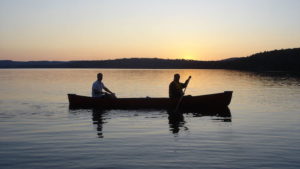
The investigation is underway for a man who created a scene in a canoe while drunk on Christina Lake, last week .... Sgt. Darryl Peppler is the commander of the Kootenay Boundary Regional Detachment. He admitted that he needed to consult the Criminal Code in order to determine whether a canoe would be considered a vessel.
"Drunk Canoe Man is Arrested," Castanet.net (4 July 2023).
I feel I should apologize for not doing my job. Peppler, and his Lonely Hearts Club Band if there is one, because if I had to actually check the Criminal Code for him to know that, then I didn't do my job. In fact, I didn't.
Obviously, I have already addressed the Canadian law regarding canoeing while under the influence. See "Canada May Legalize Drunken Canoeing" (Sept. 29, 2017). The law at the time was not clear, but there were a few cases where Canadian canoeists were charged with "operating a vessel" while impaired. The ambiguous laws led to some people believing that the prosecutions were unfair. A bill was proposed that would have changed the definition of a "vessel" so that it excluded floating objects that are "propelled solely by muscular power." However, the bill failed. The law remained ambiguous.
The intersection of Canadians' drinking and canoeing and the law that is ambiguous has been a problem. No statistics are available on the size of this problem, but at least in one case it was a serious issue.
David Sillars, in 2017, took the eight-year old son of his girlfriend on a canoe trip down the Muskoka river in Ontario. Sillars was also high, but he was able to do so because he "smoked marijuana" before leaving. He was also drinking, and was way over the limit. It's not surprising that, after the boy's death, he was found guilty of criminal negligence. He challenged this conviction on appeal by arguing the prosecution should have had to provide expert testimony in order to establish the standard for care of "a reasonably cautious canoeist." The result: affirmed.
What about the charge "impaired operation" of a vessel? Impaired? Yes. Operated? Yes. Hovercraft? No. Status of vessel is therefore unclear.
Here is the law. It is against the law to "operate[] a conveyance when a person's ability is impaired in any way by alcohol ...." Crime. Code SS 320.14(1). "Conveyance", "a motor vehicle or a vessel[,] an aircraft[,]or railway equipment". (moyen de transportId. SS 320.11. A canoe does not have a motor, nor is it designed to fly or run along rails. The question is whether a canoe counts as a vessel.
Sillars answered no because canoes were small and "vessels" were big. The other items on the list, however, are "modern modes" of transportation that require a license to operate, while canoes don't, they're more similar to bicycles.
Last year, however, the highest court of Ontario rejected these arguments. SeeR. See also: "Appeal rejected in precedent-setting fatal impaired operation of canoe case," Global News, July 5, 2022. Please send any extra hyphens to our Canadian friends who are running out.
There are many dictionaries, and not all of them agree. Sillars used a dictionary that said "vessels" must be large, but the court found other dictionaries that didn't. It pointed out that Merriam-Webster defined "canoes" as a "light narrow boat", and "boats" as a "small vessel for traveling on water".
Another problem with the second argument was that Parliament specifically considered changing the law to exclude muscle-powered cars in 2017 but did not. The other relevant statutes also suggest that Parliament did not intend to limit impaired operation liability in this way.
One of these statutes, interestingly enough, was written in French. The French version of the law that authorizes alcohol and drug testing contains a list of "conveyances", but uses "bateau" instead of "vessel". The conclusion that Parliament would not have intended to impose separate rules for English-speaking and French-speaking paddlers makes sense. Google Translate suggests that navire could be translated either as "vessel" (boat) or "vessel", but I'll defer to the bilingual judges in this case.
It is unlikely that a conviction on the canoe charge could have significantly reduced the defendant's sentence of six years, but it did not happen. The Supreme Court of Canada is unlikely to take up this case. But you never know. For now, Canadians can rest assured that the issue is resolved.
Canoes are the exception. It remains to be determined what the outcome would be, say, in the case of an inflatable raft. Cf. Alaska Man Charged with Floating Under The Influence (Aug.2, 2012) (arguing floating downriver in a raft does not constitute "navigating a boat").
.png) EntertainmentCelebrityComediansAlternative News MediaFunny VideosPrivacy PolicyTerms And Conditions
EntertainmentCelebrityComediansAlternative News MediaFunny VideosPrivacy PolicyTerms And Conditions
